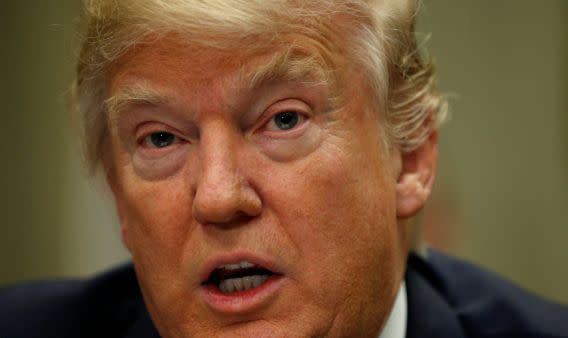Government lawyer urges 9th Circuit not to consider Trump’s Muslim ban comments

A government lawyer urged a federal appellate panel not to consider comments by Donald Trump and his advisers about wanting to ban the entry of Muslims into the United States, arguing that they should only look at the text of his executive order banning travel from seven majority Muslim nations in considering its legality under the Constitution.
The government asked the 9th U.S. Circuit Court of Appeals to overturn a lower court’s temporary stay on Trump’s ban, arguing that the stay was too broad and is an unwarranted rebuke of the president’s power to protect national security.
“The review should be confined to the four corners of the document,” said Justice Department attorney August Flentje in the case’s oral argument Tuesday afternoon. Flentje later told the judges that the text of the executive order itself should be the “end of the inquiry” for the judges.
Lawyers for Washington and Minnesota, the states that sought the stay, had cited in their suit Trump’s past statements calling for a “total and complete shutdown” of Muslims entering the country, including remarks in which he favorably compared his idea to President Franklin D. Roosevelt’s internment of Japanese-Americans. They also quoted Trump’s former adviser, Rudy Giuliani, who went on television after the ban was signed to say that Trump asked him for a “legal” Muslim ban and that the executive order was the result of that request.
“We’re not saying the case shouldn’t proceed, but it is extraordinary for a court to enjoin the president’s national security determination based on some newspaper articles,” Flentje said.
Judge Richard Clifton, an appointee of President George W. Bush, interrupted him there. “Do you deny those statements were made?” he asked. Flentje said he did not but added that even the federal district court judge who blocked the order, James Robart, said he would not look at statements Trump made while he was a candidate. Flentje asked the 9th Circuit Court to do the same.
The attorney arguing for the states of Washington and Minnesota, Washington Solicitor General Noah Purcell, brought up Trump’s statements calling for a ban on Muslims entering the country several times.
“There are statements we quoted in our claims that are rather shocking,” Purcell said, noting that the evidence of religious animus was striking, given that the case hadn’t yet gone into discovery, when both sides can demand evidence from the other.
A judge asked why Purcell believed he’d have a strong case showing that the executive order was motivated by religious animus.
“Well, your honor, for starters, the president called for a complete ban on the entry of Muslims,” Purcell said.
The attorney argued that the Supreme Court case McCreary County, Ky., v. ACLU showed that even government actions that are otherwise constitutional but were taken with the purpose of favoring one religion over the other should be struck down. (That case concerned government buildings in Kentucky displaying the Ten Commandments.)
Clifton seemed unconvinced that Purcell could prove the ban was motivated by religious discrimination or would result in religious discrimination. “So far, I haven’t heard a lot of reference to evidence and a lot more reference to allegations, and I don’t think allegations cut it at this point,” he said.
The oral argument largely centered on whether the states had standing to sue the federal government over the order in the first place, along with whether the 9th Circuit Court judges had the authority to decide on the temporary restraining order or should instead send the dispute back down to the district court.
However, the back-and-forth over the president’s previous statements about his travel ban and Muslims seems likely to be a preview of the constitutional claims that will be made when (as is almost certain) the case reaches the Supreme Court.
The oral arguments, which were streamed live (audio only) on the court’s website, lasted about an hour. The appellate panel is expected to rule quickly on the government’s request.
Read more from Yahoo News:


